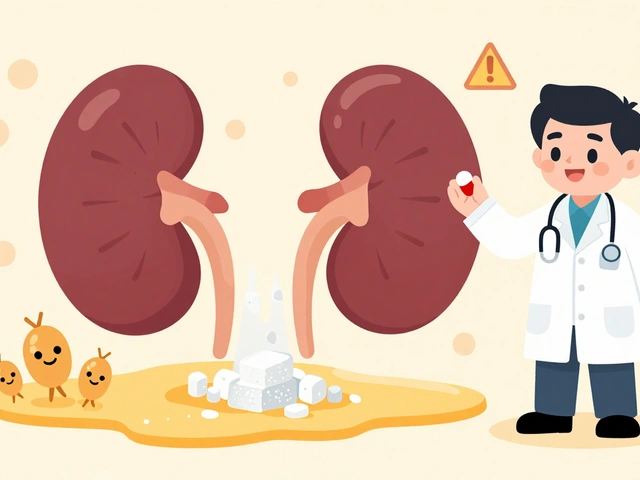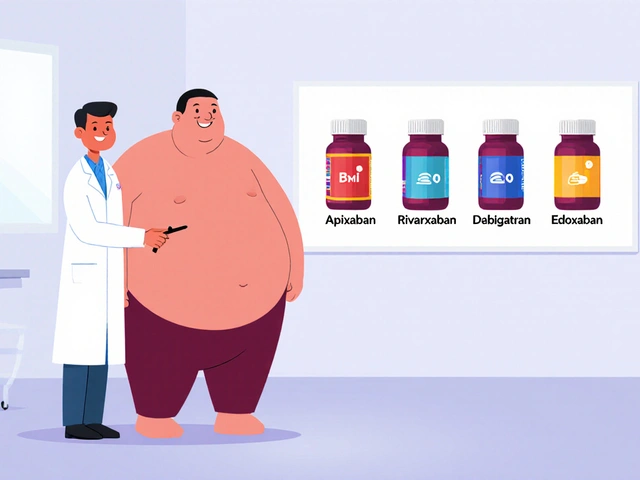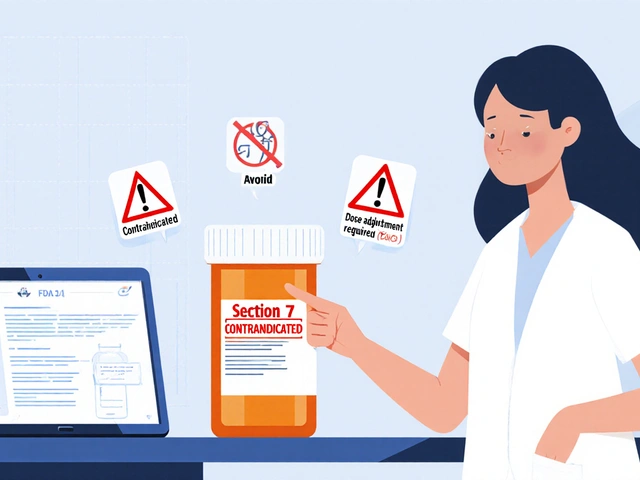Understanding Fluoxetine as an Antidepressant
Fluoxetine, commonly known as Prozac, is one of the most widely prescribed antidepressants in the world. As a selective serotonin reuptake inhibitor (SSRI), it works by increasing the levels of serotonin in the brain, helping to improve mood, sleep, appetite, and overall well-being. However, like any medication, there are pros and cons to using fluoxetine as an antidepressant. In this article, we will explore these factors in detail to give you a better understanding of this popular medication and help you decide if it's the right choice for you or a loved one.
The Benefits of Fluoxetine for Depression
There are several reasons why fluoxetine has become a popular choice for treating depression. One of the main benefits is its effectiveness. Many people who take fluoxetine experience a significant improvement in their depressive symptoms within a few weeks of starting the medication. Additionally, fluoxetine is known to be relatively safe, with fewer side effects than older antidepressants such as tricyclics and monoamine oxidase inhibitors (MAOIs).
Another advantage of fluoxetine is its long half-life, which means it stays in the body longer than other SSRIs. This can be helpful for people who forget to take their medication, as missing a dose is less likely to result in withdrawal symptoms or a return of depressive symptoms. Fluoxetine is also available in a once-a-week formulation, which some people may find more convenient than taking a daily pill.
Fluoxetine is not only effective for treating depression but also for managing other mental health conditions, such as obsessive-compulsive disorder (OCD), panic disorder, and bulimia nervosa. This versatility makes it a valuable tool for healthcare providers in treating a variety of mental health concerns.
Potential Side Effects of Fluoxetine
While fluoxetine is generally well-tolerated, there are potential side effects that users should be aware of. Some of the most common side effects include nausea, headache, drowsiness, dry mouth, and sexual dysfunction. These side effects are usually mild and lessen over time, but they can be bothersome for some people. It's important to discuss any concerns with your healthcare provider to determine if fluoxetine is the best choice for you.
In rare cases, fluoxetine can cause more serious side effects, such as increased risk of bleeding, low sodium levels, and serotonin syndrome. Serotonin syndrome is a potentially life-threatening condition that occurs when there is too much serotonin in the body. If you experience symptoms such as agitation, hallucinations, rapid heartbeat, or severe nausea and vomiting while taking fluoxetine, contact your healthcare provider immediately.
Interactions and Contraindications to Consider
Before starting fluoxetine, it's crucial to discuss your medical history and any other medications you are taking with your healthcare provider. Fluoxetine can interact with several medications, including other antidepressants, certain pain relievers, and herbal supplements like St. John's wort. These interactions can increase the risk of side effects or reduce the effectiveness of the medication.
Fluoxetine is not recommended for use during pregnancy, as it may cause harm to the developing fetus. If you are pregnant or planning to become pregnant, discuss your options with your healthcare provider. Additionally, fluoxetine can pass into breast milk and may not be suitable for breastfeeding mothers. It's essential to weigh the potential risks and benefits with your healthcare provider when considering fluoxetine during pregnancy or breastfeeding.
Adjusting to Life on Fluoxetine
It's important to remember that adjusting to life on fluoxetine, or any antidepressant, can take time. It may be several weeks before you notice any improvement in your symptoms, and it's essential to give the medication time to work. Some people may experience a temporary increase in anxiety or agitation when they first start taking fluoxetine, but this usually subsides within a few weeks.
It's crucial to follow your healthcare provider's instructions for taking fluoxetine, including the recommended dosage and schedule. Do not stop taking the medication abruptly, as this can cause withdrawal symptoms or a return of your depressive symptoms. If you need to stop taking fluoxetine, your healthcare provider will help you taper off the medication gradually to minimize any potential side effects.
Making the Right Decision for You
Ultimately, the decision to use fluoxetine as an antidepressant is a personal one that should be made in consultation with your healthcare provider. While there are many benefits to using fluoxetine, it's important to weigh these against the potential side effects and interactions to determine if it's the best choice for your needs.
Remember that antidepressants are just one part of a comprehensive treatment plan for depression, which may also include therapy, lifestyle changes, and social support. By working closely with your healthcare provider, you can develop a tailored plan to help you manage your depression and improve your overall quality of life.










Nicole Tillman April 29, 2023
Fluoxetine’s long half‑life can be a real lifesaver for folks who forget doses, because the taper off is smoother. It’s also handy that you can get a weekly formulation, which cuts down pill fatigue. The drug’s track record in treating OCD and bulimia shows its versatility beyond just depression. However, the sexual side effects can still be a deal‑breaker for many patients. It’s worth discussing any lingering concerns with your prescriber early on. Remember, the medication is just one piece of the recovery puzzle.
Sue Holten April 29, 2023
Oh great, another “miracle pill” that might mess with your serotonin.
Tammie Foote April 29, 2023
When weighing pros and cons, it helps to remember that SSRIs like fluoxetine are not a one‑size‑fits‑all solution. Many people report noticeable mood lifts within a few weeks, but others see only marginal changes. Side effects such as dry mouth or nausea often fade as the body adjusts. If you notice severe symptoms, a quick call to the doctor is the safest move.
Jason Ring April 29, 2023
i've seen a lot of folks on fluoxetine and most of them end up fine after a couple weeks but some still feel meh. the key is not to quit cold turkey, that can cause withdrawl like symptoms. also watch out for any weird bleeding or sudden weight changes. talk to your doc if you feel odd headaches or mood swings. keep a journal of how you feel daily. sometimes just a small dose tweak makes all the difference.
Kelly Hale May 2, 2023
Fluoxetine, marketed as Prozac, has become almost synonymous with modern antidepressant therapy in the collective consciousness. Its mechanism of blocking serotonin reuptake gives hope to those drowning in the abyss of depressive inertia. Yet, behind the glossy advertisements, lies a complex tapestry of pharmacodynamics that demands respect. The drug’s extended half‑life means that plasma levels remain relatively stable, sparing patients the terror of sudden withdrawal. For individuals plagued by forgetfulness, this pharmacokinetic property can be a sanctuary against relapse. Additionally, the existence of a once‑weekly formulation liberates many from the tyranny of daily pill counting. The versatility of fluoxetine extends into the realms of obsessive‑compulsive disorder, panic attacks, and even certain eating disorders, showcasing its broad therapeutic reach. Nevertheless, the narrative is not without shadows; sexual dysfunction, nausea, and insomnia weave a thread of discomfort through many treatment courses. More alarming, albeit rare, is the specter of serotonin syndrome, a condition that can spiral into life‑threatening territory if the drug is mixed with other serotonergic agents. Clinicians must therefore wield fluoxetine with a vigilant eye, constantly monitoring drug interactions such as with St. John’s wort or certain analgesics. Pregnant or nursing patients face an additional layer of complexity, as the medication can cross the placental barrier and appear in breast milk. In the hands of a knowledgeable prescriber, dosage titration can mitigate many of these risks, gradually coaxing the brain into a new equilibrium. Patient education becomes paramount; individuals should be urged to report any sudden mood swings, agitation, or physical changes without delay. Ultimately, fluoxetine represents a powerful instrument in the psychiatric arsenal, capable of restoring hope when wielded responsibly. As with any tool, its efficacy is maximized when paired with therapy, lifestyle adjustments, and a supportive network, forming a comprehensive strategy against depression.
Neviah Abrahams May 2, 2023
Fluoxetine can be a double edged sword it lifts mood but can also bring nasty side effects the key is listening to your body and not ignoring warning signs if you feel weird headaches or sudden anxiety call your doctor quickly don’t wait for it to get worse it’s better to adjust early than suffer later
Uju Okonkwo May 25, 2023
It’s important to remember that medication like fluoxetine works best when it’s part of a larger care plan. Combining it with regular therapy sessions can help you process thoughts that the drug alone can’t reach. Simple lifestyle changes, such as consistent sleep schedules and gentle exercise, often amplify the benefits. If side effects become disruptive, discuss dosage adjustments with your healthcare provider; many people find a lower dose still effective. Keep an open line of communication with your support circle, because encouragement can make a big difference in staying motivated.
allen doroteo May 25, 2023
Some folks think fluoxetine is the only fix but mental health is more than a pill. You can try CBT or mindfulness and see if that helps. If you do stay on the med, watch for any weird changes early. Talking to a doctor about alternatives is always smart. Remember, you control your own healing journey.